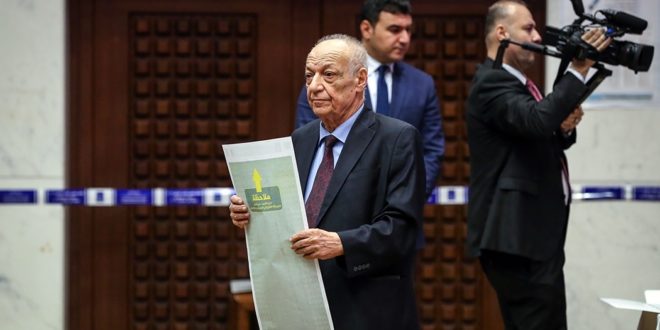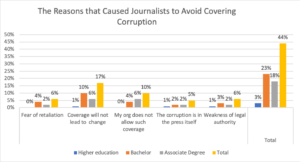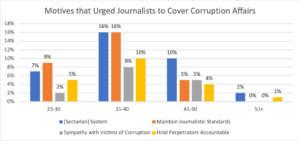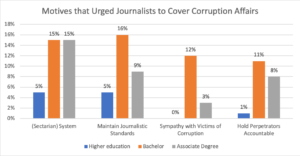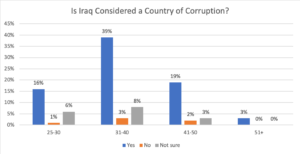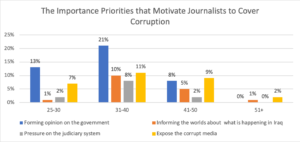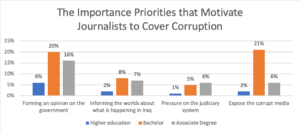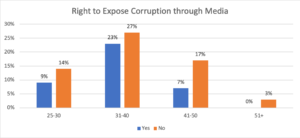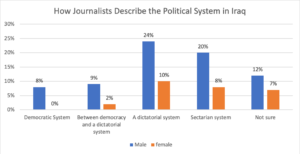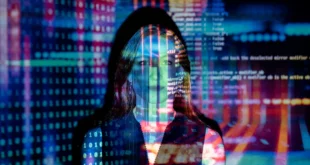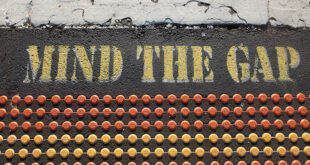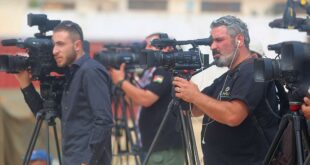Issue 30, summer/fall 2020
https://doi.org/10.70090/HN29AJPD
Abstract
The aim of this paper is to explore Iraqi journalists' perceptions of state corruption and democracy in order to deepen the understanding of the journalist’s role in democratic participation. Survey interviews were conducted ona sample of Iraqi journalists, using the theory of participatory democracy to design the instrument. The results show, based on demographic variables, a variety of perceptions towards democratization among the examined journalists, who are members of the Iraqi Journalists Syndicate. We argue that journalists can be active contributors to empowering public participation in the democratization process, a concept which closely corresponds with participatory democracy theory.
Introduction
Iraq ranked 162 out of 180 nations listed on the 2019 corruption perception index (CPI) report issued by Transparency International (2019). Additionally, the country was placed at 160 out of 180 countries in the Reporters Without Borders (RSF) 2018 World Press Freedom Index (2019). On June 12, 2018, RSF condemned the arrests of reporters who had been investigating corruption in various parts of Iraq, and called for an end to their persecution. By observing the Reporters Without Borders and Transparency International reports, which show increased risk for journalists and increasing rates of corruption, two issues arise: the first is the role of Iraqi journalists in coverage of corruption; the second is journalists’ perceptions of the Iraqi political system. In this respect, the Journalistic Freedoms Observatory (JFO) has frequently reported that local officials act with impunity, employing judicial interference and even death threats to terrorize journalists who investigate corruption (Reporters Without Borders 2018). The increasing rate of state corruption in Iraq and its relationship to the role of journalists arose as a result of the changing Iraqi political system since the 2003 United States invasion of Iraq, which set up a new political system and began a democratization process allowing Iraqi political parties to participate in the 2005 election (Altheide and Grimes 2005: 118). The attempt to expand the political system, or the democratization process (Kadhim 2013), continued with elections every four years until May 2018, which had the lowest participation rate since the Iraqi political system changed in 2003.
The low voter turnout coincided with increasing rates of corruption. In 2014, former director-general of the Iraqi Central Bank, Sinan Al-Shabibi, said that Iraq “had received a financial budget from 2003 and up to 2014 that equaled what Iraq had received from 1958 up to 2003, and it was possible to build a modern country but all the sums of money were smuggled due to corruption," (Al-Shabibi 2017). The high rate of corruption in Iraq represents the complexity of the problems in the democratization process (Hadad 2016). A National Democracy Institute (NDI 2018) public opinion poll, conducted shortly after the Iraqi elections of 2018, indicated that 71% of Iraqis believed that the election results were fraudulent. This is especially notable when examined alongside the official election results, showing that 64% of Iraqis did not participate, and it supports Iraqi beliefs that the democratization process is flawed because it is corrupt. The political system deteriorated, so these troubles increased with the high levels of corruption and with a lack of confidence in election outcomes and, in turn, a low level of participation. This paper seeks to understand how journalists perceive their roles in relation to the participants in democracy through their coverage of corruption issues in mass media. We analyze journalists’ attitudes using demographic variables to understand those perception differences and to reveal how journalists have conceived the current political system, corruption, and the role of mass media.
Since the overthrow of the Iraqi political system in 2003, more than 277 Iraqi journalists and 63 technicians and media assistants have been killed, according to statistics from Journalistic Freedoms Observatory (JFO 2020). Moreover, Iraqi journalists are not only targets of terrorism, but they are also targets of many corrupt parties seeking to assassinate those reporters who expose the truth (Sulzberger 2019). This case illustrates the conflict between journalists who seek to democratize society and forces that use corruption to stop democratization (Jebril, Stetka, and Loveless 2013). Iraqi perception shifted in October 2019, when Iraqi protesters announced demands, including political system changes and the elimination of corruption (Hannah 2020), and many Iraqi journalists showed support (United States Institute of Peace 2015) by naming the demonstrations the Tishreen Revolution (October Revolution) and Iraqi Intifada (Rubenstein 2020). The killing of sympathetic Iraqi journalists by armed militias tied to corrupt political parties has become a crisis for press freedom (Sadoon 2020). We assume, then, that the journalists’ perceptions threaten corrupt political parties and support peaceful demonstrations. Thus, our preliminary hypothesis was that Iraqi journalists' perceptions of democratic issues and corruption reflect their perceptions. Next, we considered how the demonstrations grew out of public awareness created by journalists, who disseminate their perceptions of corruption and democracy through their coverage. A representative sample of journalists was questioned about individual perceptions of corruption and democracy to reveal the validity or unsuitability of the following hypothesis: The journalists' perceptions are identical to demands of the protest movement that began in October 2019.
Theoretical Framework
The paper argues that journalists’ perceptions of their role in challenging corruption and developing democracy will give us some insight into Iraq’s “crisis of democracy”. The theory of democratic participation focuses on the centrality of media and communication institutions, founded on the principle of social responsibility and particularly prevalent in capitalist countries. “Democratic participation” reflects the definition of freedom from the democratic and parliamentary systems that have become influential in this age (Wolinetz 2012). This argument is considered by a free press as a failure due to its subordination to a centralized government and owners of capital. Building from corruption reports, public opinion polls, and popular demonstrations, this study will reveal journalists’ perceptions of their roles in covering corruption and democracy, investigating whether corrupt political parties and corrupt capitalists control the political system. Democracy in Iraq has created new uncertainties, especially as it is a society without experience with political pluralism. The political transition created civil violence and civil war in 2006 (International IDEA Newsletter 2000).
Citizens have the power to decide on policy proposals, and politicians assume the role of policy-makers. In this research, we seek to determine the perceptions of journalists’ roles as participants in a democratic society (Santiago 2008). Measures of civic disengagement, such as low and declining voter turnout, growing mistrust of democratic politicians and processes, and declining rates of participation in organized political society, can be offset by actively promoting citizen involvement in important decision-making processes—fostering what Avritzer calls “participatory public”—especially at the regional and local levels (Nylen 2003). This theory is expressed in the needs, interests, and hopes of people who receive media messages from journalists. Investigating journalists’ perceptions of their roles can give us a clear picture of the growth or the crisis of democracy, especially as corruption causes a crisis in democracy. Employing democratic participation theory, this study attempts to answer the main research questions: What perceptions do journalists have of their role in democratization, covering corruption, and building a democratic political system in Iraq? Moreover, do the perceptions of journalists differ based on demographic differences? Additionally, judging by journalists’ responses, is the theory of democratic participation and media practicable in the Iraqi context?
Along with the theory of democratization, the following terms and concepts have been defined for this study: corruption, democratic participant media, democracy, and political system. We define corruption as behavior that deviates from the normal duties of a person in a public role because of (1) that person’s influence, (2) pecuniary or status benefits, or (3) rules violations against the exercise of certain types of private benefit. This involves such corrupt behavior as the use of incentives to pervert the judgment of a person in a position of trust, or nepotism—the bestowal of patronage based on relationship rather than merit—or misappropriation—the misuse of public resources for private use (Nye 1967: 966). According to Transparency International, corruption refers to “the abuse of entrusted power for private gain.” (Pozsgai 2019) Corruption includes large-scale or petty political crime. Major corruption consists of acts committed in government that distort policies or the central functioning of the state, enabling leaders to benefit from charging ordinary citizens to access goods or services in places such as hospitals, schools, police departments, and other agencies (Transparency International 2019).
According to the United Nations Development Program, corruption is the “misuse of public power, office, or authority for private benefit—through bribery, extortion, influence peddling, nepotism, speed money, or embezzlement” (Quah 2009: 16). Corruption is moreover a transitional phenomenon due to a lack of a liberal culture or effective institutions that uphold bureaucratic practices (Sung 2004). Corruption and the rapid modernization of underdeveloped societies create moral ambiguity and increase the potential for power seeking (Huntington 1968). We defined perception as a process by which people regard, analyze, retrieve, and react to any kind of environmental information. In fact, democracy makes the people sovereign. In any form, a democratic community is a triumph over the rule of the few (Christians 2009). Vanhanen’s definition of democracy is “a political system in which ideologically and socially different groups are legally entitled to compete for political power, and in which institutional power-holders are elected by the people and are responsible to the people,” (2000: 252).
While democracy and freedom are sometimes synonymous, democracy can be regarded as a system that institutionalizes and protects freedom. Some analysts see in this a dichotomy—a state is either a democracy or it is not—but most constitutional reforms now occur in countries that are democratic to varying degrees (Kekic 2007). The two definitions of democracy used in this paper include Vanhanen’s (2000) political system description, and Samuels’ description of raising awareness of perception, in which the political system uses various subjects at the non-governmental level to define relations between the state and society (2015). Therefore, democracy is a dynamic fundamental process that ensures the mutual relationship between the state and society, including interactions among state authorities, political parties, and community groups (Vanhanen 2000). Focusing on the two definitions of Sung (2004) and Huntington (1968), corruption is related to democracy, as an obstacle to liberal culture. The most important component of democracy and corruption results from the type of modernization that Iraq has experienced during its rapid transition from a totalitarian regime to a new, elections-based political system in 2003. The design of the research questions focused on determining the attitudes of Iraqi journalists about the democratic nature of the political system and the reporting of corruption. We conclude that their perception of their role in covering corruption as a shield is conceptualized by their understanding of the democratic participant. Democracy is conceptualized based on its definition and its components (Vanhanen 2000) as a political system, defined by Syzdykova (2016) to describe state relations. In designing a questionnaire to explore journalists’ perceptions of democracy, we focused on the second aspect of democratic conceptualization, the perceptions of democratic participation and perceptions of corruption derived from a questionnaire on perceptions regarding the components of democracy.
Literature Review
This study explores Iraqi journalists’ attitudes towards democracy in their reporting of corruption issues. Previous research on the relationship of the media in democratization and corruption coverage has concluded that investigative journalism generally needs to increase political transparency and ethical governance. Experts in the study of media and democratization often find that professional journalism is related to pluralistic social discourse and public awareness of democratic policymaking. Existing studies generally agree on three intersecting themes and takeaways. First, investigative journalism influences and shapes perception. Second, investigative journalists usually act as watchdogs and gatekeepers. Third, transparent journalism does not always lead to greater public accountability and effective governance.
Haryanto (2017) argued that journalists and mass media outlets play a profound role in setting up and mobilizing social movements. Journalists influence perception by sparking controversial debates and discourse on issues such as economics, poverty, and governmental corruption. Haryanto argued journalists in Indonesia contributed to the democratic discourse by raising awareness and exposing government corruption and inefficiency. Haryanto indicated that the media is an effective watchdog, preventing government corruption. Negative media coverage, for instance, led to the resignation of a corrupt member of parliament in 2017. According to Haryanto, journalists’ success depends on the development of a pervasive agenda and news framing. Fahmy (2014) argued that journalists are instrumental in encouraging perception discourse on democracy-building and perception accountability and that journalists can act as democratic gatekeepers in such ethnically and religiously diverse countries as Iraq. Fahmy’s study found that the relationship between mass media and democratic gatekeeping largely relates to the educational qualifications and backgrounds of individual journalists. For instance, Fahmy reported journalists with higher educational achievement and increased work experience are more aggressive and investigative than less-qualified peers. In contrast, Fahmy noted perception media outlets are more critical of the government’s actions than perception news channels, and the correlation between journalists and gatekeepers is even higher when journalists belong to government-oppressed minority groups. For example, Kurdish journalists are more likely to act as gatekeepers because they believe that the central government undermines the fragile democracy and threatens their fragile independence. Nonetheless, Fahmy agreed that journalists shape perception and influence public decision-making.
McMann (2000) argued that freedom of expression is not a requirement for democratic governance and that it is inadequate in developing countries to constrain corrupt politicians. However, freedom of expression allows the public to point out corrupt politicians. Sumtai and Shem (2018) argued that the media influences people’s perceptions of corrupt behavior, finding that Nigerian media was pivotal in exposing negative behaviors including bribery, fraud, embezzlement, extortion, and electoral corruption. Nonetheless, they found that media cannot constrain or restrain politicians from engaging in corruption because influential politicians often interfere with the work of journalists. Corrupt politicians manipulate perceptions by infiltrating media outlets and using corrupt media framing strategies. The media serve as watchdogs only if journalists are independent, impartial, and transparent. Johnson and Werlin (2008) suggested that in developing countries, citizens have different and varying perceptions of corruption and governmental backwardness. They found perceptions of governmental corruption relate to standards of living and quality of life. As people enjoy more stable social and economic conditions, they are more optimistic about media reporting and investigative journalism. They suggested that perceptions regarding corruption are shaped by cultural and social norms and values. For example, in underdeveloped countries facing extreme corruption, such as Nigeria and Bangladesh, people are less worried about lower-level corruption such as lying, favoritism, and nepotism; however, the public is more concerned about corruption that directly affects living standards, such as bribery, extortion, racketeering, and vote-rigging.
Methodology
The study is based on face-to-face interviews conducted on a sample of journalists reporting corruption in Iraq. The definition of journalist in our research was essential to the design of the sample, and we adopted the definition of the Worlds of Journalism Study (WJS), which describes those who have at least some editorial responsibility for the content they create (Weaver and Wilhoite 1986). Additionally, to qualify as an Iraqi journalist, individuals had to be members of the Iraqi Journalists Syndicate (IJS). The IJS is a major journalists association in Iraq founded in 1969). They also had to either generate or edit news content (Hanittzsch and Hanusch 2017). The model was based on a list of journalists in the Iraqi Journalists Syndicate to reach the starting points using a snowball sample to identify the journalists who responded to our survey.
The sample included different Iraqi journalists to answer questions related to who the journalists are in terms of gender, age, education level, stories reported, and the type of mass media used in reporting. The sample was 73% male and about 27% female. 17% of the journalists sampled were 25–30 years old, 48% were 31-40, 27% were 41-50, and 8% were older than 51. We asked a varied sample of 100 Iraqi journalists who differ in age, gender, and education about their perceptions of their role in raising awareness. We conducted 113 face-to-face interviews inside Iraq, with a rejection rate of 13. The study used snowball sampling in multiple waves (a new sampling wave reached the journalist, an interviewee introduces the interviewer to a journalist or more potential journalists), we used the diverse seeds of a snowball sample because it is an important element for sample diversity compared to the initial seed (Kirchherr and Charles 2018). Therefore, our snowball seed diversification was classified (age, gender, educational level, and field of journalism) to cover the maximum diversity and the starting seeds for the snowball sample were varied to eight journalists (four men and four women) and each gender was composed of different ages (24–30, 13-40, 41-50). Furthermore, it was ensured that the starting seeds were diversified in terms of journalistic field and medium (television, radio, newspaper, and freelance). The independent variables were age, gender, and educational level, the dependent variable was journalist perception.
The fieldwork was conducted between February 12 and June 19, 2019. Interviews were an average of twenty minutes. The instrument was a standardized Arabic questionnaire administered by two interviewers (one male and one female). The daily interview completion rate was one to four interviews. The finalization of the instrument was achieved through repeated revision of the draft questionnaires until a version was reached that was satisfactory for the study. The instrument design was based on media democracy theory, which says that the media play an important role in monitoring, maintaining, and extending democracy, and are expected to encourage transparency and accountability by acting as the eyes and ears of citizens (Littlejohn and Foss 2009). The journalist's role is, unequivocally, to expose government oppression at all times, and to give voice to those the government may be trying to silence. Under such imperatives, there were few rules. (Harber 2004). The questions addressed in the study deal with corruption, motives that contribute to the journalist's participation in covering corruption and democratization, journalist perception of the country, the perceived importance of the journalist’s role in democratic participation. It also investigates how journalists perceive the possibility of enhancing their role in democratic participation and fighting corruption. Finally, it looks at whether journalists perceive the political system as democratic or not.
Data Analysis
To assure the reliability of the data, 10% of the data was re-entered. The data was analyzed using SPSS version 17.0 for demographic analysis and descriptive statistical analysis. The analysis allows for insights on the magnitude and direction of the relationship between the demographic variables and journalist perceptions. Our statistical analysis of significance takes into account the effect of the demographic variables (gender, age, education) on journalists' perception toward democracy and covering corruption. Statistical cross-tabulation techniques were employed to test the perception differences if they exist.
Results
Corruption has become one of the rising challenges to democracy and society, and the media is helping to shed light on corruption and to reverse the trend by providing coverage on topics including journalism and media investigations. Journalism plays an important role in spreading awareness and uncovering the hidden features of corruption, limiting its presence by sharing content through existing media outlets. The following are the survey results on Iraqi journalists’ perceptions of their role in democratization and covering corruption.
Figure 1. Journalist perceptions towards covering corruption according to their education
The field research findings show that 56% of the interviewed journalists’ report on corruption, while the remaining 44% do not cover corruption (Figure 1). This means that the participation rate in raising awareness is slightly higher than the non-participation rate. Most journalists who raise awareness of corruption issues are between ages 31-40, and this age group represents the highest percentage of non-participation in democratization. By gender, Iraqi journalists explained their role in democratization, with 43% of men performing a role and 30% of men not performing the role. Among female journalists, these numbers were 13%, and 14% respectively. Additionally, journalists' perceptions of democratization through educational, qualification-based corruption reporting was 31%, while 23% did not participate in the coverage. For journalists' degree and education level, the perception was 17% participation, and 18% non-participation. Moreover, masters and PhD-level journalists have 8% participation and 3% non-participation, respectively.
Journalists' Perceptions of Participation in Democratization
Democracy today does not automatically guarantee large citizen participation. The theory of democratization depends on the element of participation, and it recognizes that the causes of the crisis of democracy relate to journalists being discouraged to report corruption and therefore to participate in democratization. Our investigation shows 44% of journalists have several assumptions that prevent them from participating in the democratization process: 6% of journalists’ reported avoiding participation because of fear of revenge, 17% said their reporting will not change the reality of corruption, 10% reported that their media organizations prevent them from reporting, 5% said that the press establishment is also corrupt, and 6% said that the Iraqi judicial system is weak (Figure 1). Notably, the reason journalists cited most often is their assumption that their coverage will not change the situation. Secondly, some press organizations prevent journalists from covering corruption. Viewed by gender, 14% of male journalists reported that participation in democratization and corruption coverage will not spur reform, and 3% of female journalists held the same belief. Additionally, 8% of male journalists perceived that their press institutions prevent them from covering corruption or participating in the democratization process, while 2% of female journalists perceived this. Analyzing the results according to age group (Figure 2), we found that 17% of journalists aged 41-50 perceived that covering corruption and participating in democratization would not change reality for the better. In this group, 10% said that their press institutions prevent them from participating in democratization and reporting on corruption. In terms of educational level (Figure 3), highly educated journalists reported that nothing stops them from participating in democratization. For journalists with bachelor's degrees, 4% said fear of retaliation prevents participation in democratization, 10% reported that participation would not change reality, and 4% said their press institutions discourage participation.
Motives for Participation in Democratization
Democratization theory is based in social responsibility standards, in reaction to corporate mass media, and in response to the consolidation of media organizations. Understanding Iraqi journalists’ perceptions of social responsibility informs their roles in the political system. The motives of 20% of journalists covering corruption involved publicizing corruption; with 10% between 31-41 years old, and 5% aged 25-30 years, nearly equal to the 41-50 age group. The lowest participation ratio for the motive of publicizing corruption was among journalists ages 51 and above. Moreover, 15% of journalists who were motivated to cover corruption expressed sympathy for the victims of corruption, and 30% were motivated to apply the rules of journalism. Additionally, the motives of 35% were to change the sectarian political system, and 28% of male journalists and 7% of female participated in democratization because of the desire to change from a sectarian to a democratic system. Commitment to journalistic ethics motivated 21% of male and 9% of female journalists to participate. Furthermore, 16% of male and 4% of female journalists were motivated to cover corruption. No significant educational differences were observed.
Figure 2. Journalist motivations to participate in democratization according to their age.
Figure 3. Journalist motivations to participate in democratization according to their education.
Journalists’ Perception of the Government.
Regarding government, 77% of the journalists interviewed—56% men and 21% women—reported a perception that Iraq is a corrupt country, while 5% of journalists—4% men and 1% women—rejected the perception that Iraq is corrupt. Moreover, 13% of male journalists had no clear perception of whether Iraq’s government is corrupt or not, compared to 5% of female journalists with that uncertainty. According to Figure 4, 16% of journalists between the ages of 25 and 30 perceived that Iraq is a corrupt country, compared with 1% who perceived Iraq is not a corrupt country, and 6% who were uncertain. Moreover, 40% of journalists between the ages of 31 and 40 perceived Iraq as a corrupt country compared to 2% who perceived that Iraq is not a corrupt country, with 8% who were uncertain. Furthermore, 18% of journalists between the ages of 41 and 50 perceived Iraq as a corrupt country, compared to 2% who perceived Iraq is not a corrupt country, and 4% who were uncertain. Finally, with respect to journalists aged 51 and over, 3% perceive that Iraq is a corrupt country, compared to 3% who were uncertain. Out of the 11% of journalists with PhD and master’s degrees, 10% perceived that Iraq is a corrupt country, compared with 1% who were uncertain. Of the journalists with bachelor’s degrees, 42% perceived Iraq as a corrupt country, compared with 5% who perceived that Iraq is not corrupt, and 7% who were uncertain. Among the 35% of journalists with diplomas, 25% perceived Iraq as a corrupt country, 1% perceived Iraq as not corrupt, and 9% were uncertain. Most journalists, regardless of gender, age, or educational level, perceived the importance of reporting corruption in influencing public perception. The group with the most significant perception of the importance of participating in democratization were those aged 31-40 (50%), followed by the 41-50 group (24%), and the 21– 30 (23%).
The perception ratios of the importance of participation in democratization were close, including perception, truth-telling to the world, pressuring the judicial system, and publishing in the press. For male journalists, 42% perceived value in participation in democratization, and 11% of women shared this perception. Moreover, 14% of male journalists perceived the importance of informing the world of what is happening in Iraq. Additionally, 3% of female journalists reported the same perception. Another perception among 9% of male journalists was that participation in democratization should press the judicial system to bring the corrupt to justice. Moreover, 19% of male journalists perceived their participation in democratization as exposing corruption and corrupt people in the media, and 10% of female journalists had the same perception. Among journalists with PhD and master's degrees, 9% perceived participation in democratization creates awareness, compared to 20% with bachelor's degrees, and 16% with diplomas. Another 2% of journalists with PhDs. and master's degrees perceived that their participation would create global awareness about Iraqi corruption.
Figure 4. Perceptions of Iraq as corrupted country according to age
Journalists’ Perception of Rights of Participatory Democracy
According to Figure 7, 61% of Iraqi journalists reported a perception that they have no right to participate in the democratization process, while 27% perceived they had the right to do so. Here, we can see different reactions to the crisis of democracy in the high rate of the perception (34%) that engaging in democratization is wrong for journalists. For 27% of journalists aged 31-40, the perception was that they have no right to participate in democratization, compared with 23% who perceive that they have the right to participate. Male journalists, at 29%, reported they have the right to participate in the democratization process by covering corruption, compared with 10% of female journalists. Yet 44% of male journalists perceived the right to participate in the democratization process by reporting corruption, compared to 17% of female journalists. Among journalists with bachelor's degrees, 32% perceived that they do not have the right to participate in democratization, and 22% of those with diplomas, and 7% with PhD and master's degrees shared that perception. In contrast, 22% of journalists with bachelor's degrees perceived that they have the right to participate in democratization, compared to 13% of those with diplomas and 4% with PhDs and master's degrees.
Figure 5. Perceptions of the importance of participatory democracy by covering corruption
Figure 6. Perceptions of the importance of participatory democracy by covering corruption according to education.
Figure 7. Perceptions of their right to participatory democracy by covering corruption according to age.
Perceptions of Enhancing Participatory Democracy
Among those interviewed, 46% perceived that laws must be enforced to protect journalists, 35% perceived that they need security protection to be able to participate in democratization, 10% perceived that journalists require training, and 9% perceived there is a need to establish a special department on corruption issues in press institutions. Among those aged 31-40, 17% perceived that laws should protect journalists, 22% perceived they need security protection to participate in democratization, 4% perceived a need to train journalists, and 7% perceived a need to establish a special department focusing on corruption cases in press institutions. There were no significant differences in other age groups. Moreover, 27% of male journalists perceived a need for security protection, and 8% of female journalists shared this. Among male journalists, 8% had a perception of the need to train journalists and develop their abilities, compared to 2% of female journalists. Furthermore, 7% of male journalists had a perception of the need to establish a special department to cover corruption cases in press institutions, compared to 2% of female journalists. Among male journalists, 31% perceived the need to enforce laws that protect journalists, compared to 15% of female journalists. Moreover, 6% of journalists with PhD and master's degrees have a perception of the need to provide protection for journalists, while 19% of journalists with bachelor's degrees, and 10% with diplomas expressed that perception. In contrast, only 1% of journalists with PhD and master's degrees perceived the need to educate and develop journalists, compared to 5% of journalists with bachelor's degrees, and 4% with diplomas. Moreover, 5% of journalists with bachelor's degrees perceived that media institutions must set up a corruption reporting unit, compared to 4% of journalists with diplomas. Furthermore, 4% of journalists with PhD and master's degrees perceived the need to enforce laws protecting journalists, compared to 25% of journalists with bachelor’s degrees and 17% of journalists with diplomas.
Journalists’ Perceptions of the Political System
Under this formulation, democracy is interpreted as an entity, concept, and, more precisely, a political system. This logical treatment, therefore, is classificatory, binary, dichotomous, or disjunctive treatment: we should determine whether a given polity is democratic or not (Sartori 1987). The importance of journalists’ perceptions of the political system is, therefore, to examine how they perceive democratic values. Moreover, 8% of male journalists asserted that their perceptions is that the Iraqi political system is democratic, while female journalists did not. Among male journalists, 9% said that they perceived the Iraqi political system as between democracy and dictatorship, compared to 2% of female journalists. In contrast, 20% of male journalists said they perceived the Iraqi political system as divided along sectarian lines, compared to 10% of female journalists. Nevertheless, 12% of male journalists said they were uncertain of their perception of the Iraqi political system, compared to 7% of female journalists. Additionally, only 3% of journalists perceived the political system as democratic, while 9% of journalists between the ages of 31–40 perceived the political system as between democracy and dictatorship, compared to 21% of journalists in that group who perceived the political system as a dictatorship, and 8% of journalists between 41-50 agreed. Furthermore, 14% of journalists between the ages of 25-30 perceived the political system as a divided sectarian system, and 7% of journalists between 31-40 and 41-50 have the same perception.
Figure 8. Perceptions of the political system in Iraq according to gender.
Only 1% of journalists with PhD or master’s degrees perceived the political system as democratic, and 2% described it between democracy and dictatorship, 4% as dictatorship, and 4% unsure. Among journalists holding bachelor’s degrees, 6% perceived that the political system is democratic, another 6% perceived that the political system as between democracy and dictatorship, 16% perceived it as dictatorship, 16% perceived it as a sectarian system, and 10% were uncertain. With respect to journalists with a diploma, about 1% perceived the political system as democratic, 3% between democracy and dictatorship, 14% as dictatorship, 12% as a sectarian system, and 5% were unsure.
Discussion and Conclusion
Journalists’ perspectives play a major role in shaping democratic transformation and political reform in different societies. Their perceptions of the democratization process depend on the form of political system and other factors such as freedoms, integrity, and corruption. Strengthening the values of political participation and decision-making relates to the philosophy of the political system in which it operates and the degree of freedom it enjoys. For the media to be democratic and easily accessible or participatory, according to democratization theory, there should be no monopoly, centralization of the press, or top-down policy. This theory is also known as the Democratic Participant Theory of Mass Communication (Vil’anilam 2019). The theory explains changes in voting behavior and how this has been reflected in low turnout rates (Matsusaka 1995). It concluded that citizen apathy is triggered by their assumption that few things could be changed by voting every once in five years or so. The government establishment and the political system once appeared immutable (Vil’anilam 2019). However, the lack of participation in Iraqi elections has become a problem for the democracy project in Iraq, and, according to democratization theory, journalists are a key tool for political reform through their participation in the identification and coverage of corruption. To reveal this, we need to consider the prospective outlook of Iraqi journalists on democracy-hindering corruption.
Media Content and Control of Journalists’ Roles.
One of the most important components of democratic participatory theory is the possibility of media institutions controlling the content of journalists’ reports (Vil’anilam 2020). Based on the results of this study, 44% of journalists avoided covering corruption as the political parties have controlled the content of Iraqi journalism. Furthermore, 10% of Iraqi journalists in this study reported that their media institutions do not allow them to cover corruption, while another 5% of journalists perceive that they are unable to cover corruption because their media establishments suffer from corruption as well. Among journalists, 6% reported avoiding covering corruption in order to avoid the revenge of powerful authorities. The weakness of the Iraqi judicial system is another proscription against covering corruption. These factors indicate that both the democracy crisis and the decline in election participation rates result from several factors threatening journalists’ freedom to address media content.
The Democracy Crisis.
The main objective of this research was to understand the perception of journalists with respect to their roles in democratic societies, and it is important to know the perception of Iraqi journalists with respect to whether or not the Iraqi political system is democratic to determine if the theory of democratic participation is applicable in the case of Iraq. If the survey results confirmed that the political system is undemocratic, then the theory would not apply to the role of Iraqi journalists covering corruption within the democratization process. In the theoretical framework, we quoted and considered the definition of democracy as a political system, and the survey results of the journalists’ perceptions of the political system include democratic and other forms of government, indicating that journalists do not perceive the political system as democratic. In fact, only 8% perceive it as a democratic system. Moreover, 34 % perceive the political system is a dictatorship, 28% perceive the political system as a sectarian system, and 11% divided their perception between dictatorship and democracy. Additionally, these results indicate that the political system in Iraq is not democratic, and this illustrates the crisis of democracy in Iraq and the challenge of applying the theory of democratic participation. Moreover, this study emphasizes the importance of journalists’ roles in correcting the political system and seeking a transition to a democratic system through raising public awareness. Another indicator is that 35% of journalists perceive that their main motivation to perform their journalistic role is to change the political system to democracy, and another 30% said they are motivated to cover corruption because they believed it to be their role. Moreover, we found that journalists perceive that there is a crisis in democracy and that the political system needs to change to become democratic.
Raising Public Awareness.
Raising awareness is a key factor of democratic participation, playing an essential role in the 2018 Iraqi election, where Iraqis and journalists campaigned against participation as an expression of distrust of the democratic process. We noted a significant decline in the participation rate in the 2018 election, compared to previous ones. In fact, the participation rate reached 42% in the 2018 election, according to the High Electoral Commission in Iraq, while the participation rates for previous years had been up to 65%. This provides insight into the effect of the journalist’s role in the campaign and the impact on public perception in driving a response. One of the most important implications of the theory of democratic participation is service to the people, and, according to our survey results, there is evidence of Iraqi journalists perceiving their roles in raising awareness of corruption among the public. Furthermore, the results of the survey interviews confirmed that 42% of journalists in our study perceived the importance of this role. Furthermore, this study confirmed that 17% of journalists perceive the importance of their role in raising public awareness globally, including facts about Iraqi corruption. It also confirmed that 29% of journalists perceive that the importance of their role comes from exposing corruption through the media, and the importance of its role in society. Moreover, it affirmed that 12% of journalists perceive their roles include exposing corruption to legal authorities.
Developing Democracy Perception by Developing the Role of Journalists.
In this paper we considered perception as a process by which people regard, analyze, and retrieve. Therefore, journalistic perception is based on their roles and influence in society in order to develop democratic participation. Additionally, the development of journalists’ roles and influence in society requires the building and strengthening of the values and systems of democracy, such as freedom of the press and freedom of speech, and to activate these values through journalism. Thus, we investigated the perceptions of Iraqi journalists about their role in democratization and corruption coverage, finding it significant that 46% of journalists concluded that they needed to promote laws protecting journalists' rights to develop their roles and thus develop democracy and participation. In contrast, 36% of journalists perceived the need to provide security for journalists to enable them to develop their role, suggesting that security is complex, preventing journalists from supporting democratization. Another 10% of journalists concluded that journalism training enabled them to develop their roles in democratization and covering corruption, and still another 10% concluded that establishing new media institutions would support specialized corruption coverage. Furthermore, based on democratic participation theory, it is clear that media institutions lack the institutional structure to enable them to play their role in supporting democratization. Demographically, there are no differences between the perceptions of journalists based on their age, educational level, and gender. Their responses indicated that male journalists participate more than female journalists because there are more men working in the field of journalism than women. Additionally, the perceptions data revealed that the most participatory journalists are aged 31-40.
Ultimately, the theory of democratic participation does not apply in the Iraqi context because most journalists perceive that the political system is not democratic, and they have concluded that democracy must be implemented to enable them to play their part. Control over publishable content, preventing corruption coverage, intimidation, and threatening journalists’ lives are all factors designed to reduce the role of journalists in support of democracy. The results of this research confirmed that the perceptions of Iraqi journalists correspond to the demands of Iraqi demonstrators, and this confirms the validity of the research hypothesis, as journalists' perceptions are identical to the protest movement’s demands. The protest movement began in October 2019 and continues today. Finally, it is noted that there are no significant differences between the demographics of journalists in their perceptions of participation in democracy and in the detection of corruption.
 Arab Media & Society The Arab Media Hub
Arab Media & Society The Arab Media Hub
